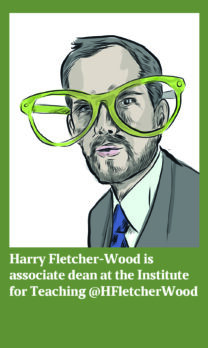Reviewer Harry Fletcher-Wood shares his top picks from the edu-blogosphere this week
Why did a small, badly designed experiment make me change my teaching forever?
@Waldenkent
It was obvious to Ben White that his “students had suspect ideas about note-taking”, but he was more surprised to discover that he had “some deeply ingrained assumptions about it”.
White was worried that thinking had been detached from writing, and studying was not leading to learning. He conceived “a simple experiment” to “prove to my students just how futile their approach was”, in which one class would write notes and another would study the same topic with challenging questions; and a test checked what they remembered the next day.
“I predicted that transcription would presumably not add much to pupil learning though it would slow the lesson down,” he writes. “Thus I would expect the group learning in this way to cover less ground and remember no more of it than the class which didn’t waste time writing neat copies of their notes booklets.” However “things did not go as expected”.
He says penny dropped when a student from the non-note group was surprised they remembered nothing about the lesson: “I remember the lesson, remember talking about Schaffer and Emerson and the video. It was really good, I just can’t remember anything in specific.”
Reflecting honestly about why his “smugly developed attempt to weed out pointless writing [was] scuppered by its own results”, White highlights his own biases about what makes good learning, and notes how valuable and enjoyable an experiment can be in improving teaching.
AfL in science: a symposium
@AdamBoxer1, @Rosalindphys, @chemDrK
Adam Boxer describes a difference of opinion with a senior colleague observing his lesson, and traces its roots to an excessive focus on generic approaches to teaching. He highlights the lack of “disciplinary substance” in the application of assessment for learning, and introduces coordinated blog posts from teachers seeking to bring an evidence-based perspective to AfL in science.
When this column went to press, two had been published: Rosalind Walker sought to define what learning in science really is and Niki Kaiser had examined the threshold concepts students experience as their understanding of science changes. Each post makes a fascinating and valuable contribution, sharing considered responses from teachers. Even more valuable is the sophisticated approach to collaboration which brings these teachers’ experiences and understanding together as a coherent discussion.
Can you be a great leader without technical expertise?
Art Markman
Markman begins by describing the “broad assumption in society and in education that the skills you need to be a leader are more or less transferable. If you can inspire and motivate people in one arena, you should be able to apply those skills to do the same in another venue.” For example, leaders need to be able to motivate themselves and others, communicate, think critically, and so on.
He shows that effective communication depends on the content: “Doctors talking to patients must communicate information differently than politicians reacting to a natural disaster.”
When we teach leadership, he argues, we need to “be more explicit that domain expertise matters. Just because a person is successful at running one kind of organisation does not mean that they are likely to have the same degree of success running an organisation with a different mission.”
Starting at a new school
@jo_facer
I’ve always enjoyed Jo Facer’s honest, practical and inspiring approach to writing and teaching, so it was a pleasure to read her suggestions on what to do when starting a new school as a senior leader. Her advice includes asking the “stupid questions”. For instance, “where do I stand for playground duty?”, because sooner or later people will look to you and you need to be getting it right.
Think about what you would change, with the “fresh eyes” you bring (but don’t push it) and she recommends escalating “like a newbie”. I look forward to reading her continued reflections on teaching and leadership at her new school.













Your thoughts